Percussion Quartet of the Week
Brooklyn-based Sō Percussion Plays Works by Cage and Reich

Percussion has come a long way in the last 20 years, stepping out of the compositional shadows and into the spotlight as more and more interesting music gets written for percussion ensembles. At the forefront of this percussion revolution is Sō Percussion — the Brooklyn-based quartet that will be performing at Campbell Hall on Tuesday, November 1, and conducting a free, open-to-the-public workshop with UCSB students at UCSB’s Lotte Lehmann Concert Hall on Monday, October 31 — and when you see them, you’ll understand why. New York Times critic Allan Kozinn, writing about the group’s “Imaginary City” project in 2009 said, “If you think about it, drums are the new violins.”
When Eric Beach, Josh Quillen, Adam Sliwinski, and Jason Treuting hit the stage at UCSB on Tuesday, they’re likely to be surrounded by an amazing and unpredictable array of percussion instruments large (a full drum kit, two vibraphones, and two five-octave marimbas) and small (cooking timers, wind-up toys, and the occasional spoon). Nurtured by the Yale Music Department and a mutual love of contemporary composers like Steve Reich and John Cage, Sō Percussion is, as Sliwinski told me last week by phone, “living the dream that we had as college students — we are a percussion quartet that supports itself by touring full-time to play the music that we love. Back when this started, that result seemed unlikely.”
Unlikely and amazing, as anyone who has caught the group live will attest. In 2008 at the Ojai Music Festival, Sō Percussion was part of a larger ensemble that included Steve Reich himself, who got together for an extremely memorable afternoon performance of his 70-plus-minute classic “Drumming.” Tuesday’s program will include “Mallet Quartet,” a recent piece by Reich written expressly for the group. Another one to look out for is “Third Construction” by John Cage, which is, according to Sliwinski, “a masterpiece and a barn burner.” And as far as unusual instruments go, Sliwinski mentioned a “special appearance by an amplified cactus.”



